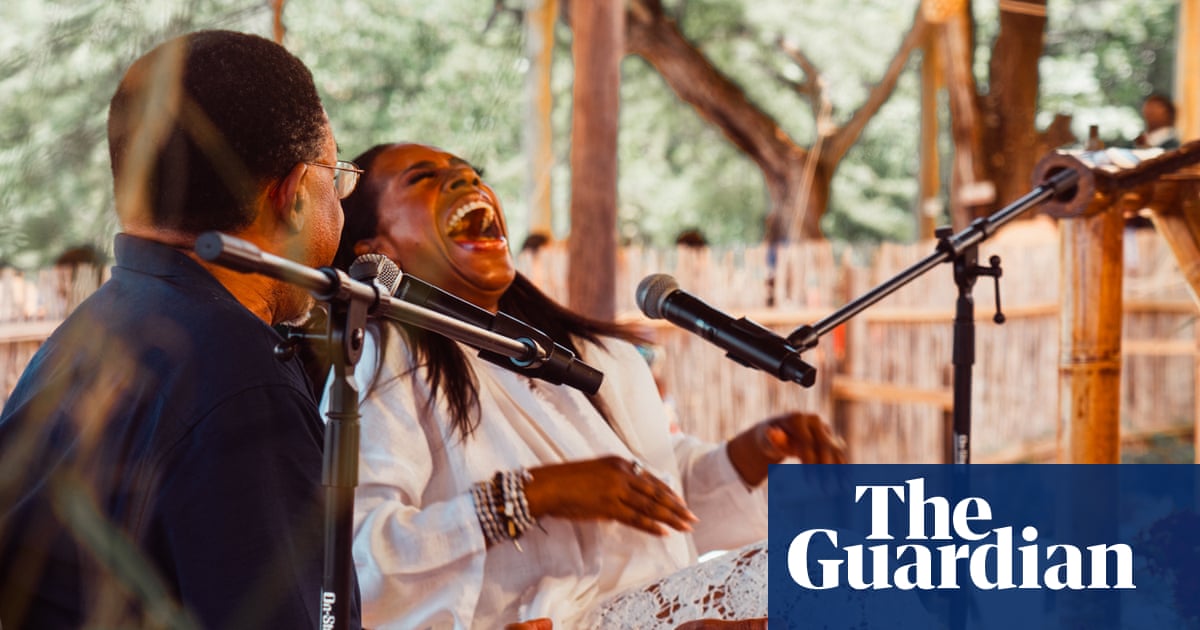“Do I look like a rebel?” Booker prize winnerMarlon Jamesjokingly asks the crowd moments after walking on stage, head-banging his dreads to the sound of Nirvana’s Smells Like Teen Spirit.
If your only experience of literary festivals are polite, well-mannered affairs inside tents in the British countryside, the Calabash literary festival, held on Jamaica’s Treasure Beach, hits differently. It’s not just the setting but the rare joy of seeing a majority-Black audience and roster at a literary event. It’s a festival infused with the magic and fire born of resistance.
James was one of many authors who shared that, were it not for the festival, he wouldn’t be the literary giant he is today. It was after one of Calabash’s now-legendary open mic sessions that he secured his first publishing deal. No surprise, then, that people waited in snaking lines, some for well over an hour, to get their three minutes on the mic.
For festival-goers, one of the most anticipated readings of the weekend was from Safiya Sinclair’s National Book Critics Circle award-winningHow to Say Babylon– on home soil for the first time. Her book chronicles growing up in 80s and 90s Jamaica as a Rastafarian girl, and she read a haunting passage about deliberately stepping on a rusty nail after being ostracised at school. This was at a time when the legacy of Jamaica’s first prime minister Alexander Bustamante, and his infamous 1963 command to “Bring in all Rastas, dead or alive” still loomed.
The Calabash literary festival was founded in 2001 by poet Kwame Dawes, novelist Colin Channer, and producer Justine Henzell (whose family own and run Jakes, the beachfront hotel where the festival is hosted). What began as a small event in Jakes’ lobby with only 150 guests now attracts thousands, a quarter of a century later. And, unlike most literary festivals, Calabash is completely free to attend. “Passion is the only price of entry,” its website states – though adds that “voluntary contributions are welcomed”.
The festival’s allure is undeniably amplified by its ludicrously picturesque setting: piercing blue skies, crashing waves and endless rays of sunshine frame the stage from which authors speak. If you thought Treasure Beach a sleepy town full of beach bums, fishers, locals and ex-corporate types who have traded in their careers for psychedelic retreats, you wouldn’t be entirely wrong. But as the festival begins, a rebellious spirit is ushered in. The weekend’s format is simple: readings arranged around specific themes, punctuated by a handful of headline talks.
The crowd at Calabash is a world unto itself, made up of authors and book lovers from across the Caribbean, as well as from the UK, US, Canada and South Africa. A new wave of influencers were also in attendance, including prominent bookstagrammers like Trinidad-based @bookofcinz and South Africa’s @prettybookish, who now play an increasingly important role in elevating Caribbean and diasporic literature.
Standout sessions from the weekend includedCaleb Femi, a former young people’s poet laureate and the author of Poor. He brought south-east London to Calabash with four poems from his sophomore collection The Wickedest – a portrait of one party night told through the eyes of flirtatious guests, unwanted intruders and their fearless leader. Laughter echoed throughout. Danez Smith, author of Homie and Don’t Call Us Dead, read work that could melt even the coldest of hearts – opening with a tribute to the gully queens (Jamaica’s trans community), thanking their lesbian friends for teaching them how to love, and sharing poetry in the form of a love letter to their formidable grandmother. Mary-Alice Daniel gave perhaps the most brilliantly absurd reading of the weekend, sharing surreal poems and a hilarious piece of prose about the loss of her toe.
Sign up toBookmarks
Discover new books and learn more about your favourite authors with our expert reviews, interviews and news stories. Literary delights delivered direct to you
after newsletter promotion
Other literary heavyweights on the roster includedIan McEwanand Abbott Elementary’s Emmy-winning Sheryl Lee Ralph, who closed the festival with a celebration of her memoir Diva 2.0, which traverses her journey from growing up in Jamaica to entering Hollywood.
And of course, this is Jamaica – so while the days were filled with conversations about craft and storytelling, the nights belonged to music. On Friday and Saturday, the festival turned into a party, with live performances and DJs that didn’t start until midnight. And Sunday afternoon closed with a moving celebration of the 50th anniversary of Burning Spear’s album Marcus Garvey, a tribute to the power of roots reggae as a form of cultural memory and resistance.
Over dinner that final night, there were discussions about how such a small island has managed to have a gargantuan, global cultural footprint, especially within the world of literature. Dawes, one of the organisers, pointed to Jamaica’s history of rebellion, including the largest of slave uprisings, as the root of its spiritual and creative fire.
“Jamaica was the site of the most virulent practices of the transatlantic chattel slavery,” Dawes says. “While we can speak of the negative legacy of this truth we can also speak of the restorative and inventive power of resistance and rebellion [that has] allowed this small population of 2.5 million people to have an absurdly outside global impact as a culture.”
“Despite the hardships of history,” he adds, “there is a necessary confidence that is part of the Jamaican spirit.”
The nextCalabash literary festivalwill take place in 2027
